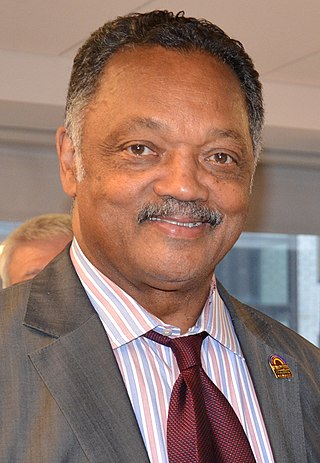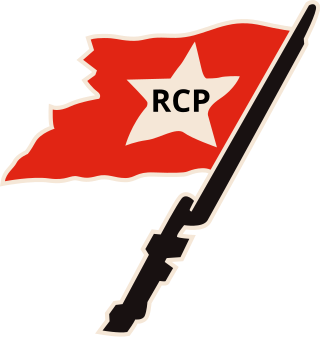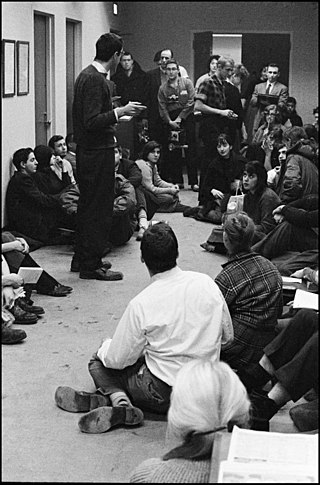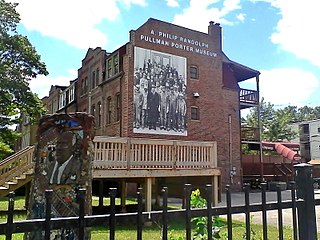Related Research Articles

AIDS Coalition to Unleash Power is an international, grassroots political group working to end the AIDS pandemic. The group works to improve the lives of people with AIDS through direct action, medical research, treatment and advocacy, and working to change legislation and public policies.
Holy Cross Hospital is a 160-bed general medical Roman Catholic hospital located in the Chicago Lawn neighborhood of South Side, Chicago, Illinois, at 68th Street and California Avenue. It is part of the Sinai Chicago hospital system.

The Brown Berets is a pro-Chicano paramilitary organization that emerged during the Chicano Movement in the late 1960s. David Sanchez and Carlos Montes co-founded the group modeled after the Black Panther Party. The Brown Berets was part of the Third World Liberation Front. It worked for educational reform, farmworkers' rights, and against police brutality and the Vietnam War. It also sought to separate the American Southwest from the control of the United States government.

The University of Chicago Medical Center is a nationally ranked academic medical center located in Hyde Park on the South Side of Chicago. It is the flagship campus for The University of Chicago Medicine system and was established in 1898. Affiliated with and located on The University of Chicago campus, it also serves as the teaching hospital for Pritzker School of Medicine. Primary medical facilities on campus include the Center for Care and Discovery, Bernard A. Mitchell Hospital, and Comer Children's Hospital.

Jesse Louis Jackson is an American political activist, Baptist minister, and politician. He is the father of former U.S. Representative Jesse Jackson Jr. and current Representative Jonathan Jackson.

The 2012 presidential campaign of Jill Stein was announced on October 24, 2011. Jill Stein, a physician from Massachusetts, gave indication in August 2011 that she was considering running for President of the United States with the Green Party in the 2012 national election. She wrote in a published questionnaire that she had been asked to run by a number of Green activists and felt compelled to consider the possibility after the U.S. debt-ceiling crisis which she called "the President's astounding attack on Social Security, Medicare and Medicaid – a betrayal of the public interest."

The Revolutionary Communist Party, USA is a communist party in the United States founded in 1975 and led by its chairman, Bob Avakian. The party organizes for a revolution to overthrow the system of capitalism and replace it with a socialist state, with the final aim of world communism.

Harper Court is a mixed-use commercial development in the Hyde Park community area on the South Side of Chicago, Illinois, United States, that includes a Hyatt Hotel and a 12-storey office tower that is leased and occupied by the University of Chicago. Although the hotel opened on September 17, 2013, the commercial structure, which also has extensive retail and parking space, officially opened on November 8, 2013. The University of Chicago exercised its option to purchase most of the development on November 13 and then put most of what it acquired up for sale in March 2014. The University provided much of the financing and retains a master lease over the retail tenants. The development was acquired by Clal Insurance Company in July 2014.

Black Lives Matter (BLM) is a decentralized political and social movement that seeks to highlight racism, discrimination, and racial inequality experienced by black people. Its primary concerns are incidents of police brutality and racially motivated violence against black people. It started following the killings of Trayvon Martin, Michael Brown, Eric Garner, and Rekia Boyd, among others. The movement and its related organizations typically advocate for various policy changes considered to be related to black liberation. While there are specific organizations that label themselves simply as "Black Lives Matter," such as the Black Lives Matter Global Network, the overall movement is a decentralized network of people and organizations with no formal hierarchy. The slogan "Black Lives Matter" itself remains untrademarked by any group. Despite being characterized by some as a violent movement, the overwhelming majority of its public demonstrations have been peaceful.

Carlos Ramirez-Rosa is an American politician. He has served as the Alderperson for Chicago's 35th Ward since May 18, 2015. He is Chicago Mayor Brandon Johnson's Floor Leader, and chair of the Chicago City Council's Committee on Zoning, Landmarks, and Building Standards.

The University of Chicago sit-ins were a series of nonviolent protests at the University of Chicago in Chicago, Illinois in 1962. The protests were called to end alleged segregation in off-campus university owned residential properties.
Moral Mondays Illinois is a series of protests modeled after similar Moral Monday demonstrations that took place in North Carolina. The demonstrations are organized by Fair Economy Illinois and led by clergy members. Moral Mondays Illinois protesters "demand that Illinois' elected officials tax corporations and the rich in order to fix the state's gaping budget deficit" rather than the budget cuts proposed by Illinois Governor Bruce Rauner.
Susan Sadlowski Garza is a member of the Chicago City Council serving as Alderman for the 10th ward. The 10th ward is located on Chicago's southeast side and includes East Side, Hegewisch, Jeffrey Manor, South Chicago and South Deering. She initially assumed office after defeating Rahm Emanuel ally John Pope in the 2015 election. During the 2019–23 term, she was selected to be the chair of the Chicago City Council Progressive Reform Caucus.

Chris Devins is an artist/urban planner from Chicago, Illinois who engages in placemaking, which blends Art and Urban Planning. He is the creator of several outdoor Art initiatives in the Chicago area, including Hyde Park Heroes, the Pullman Project, Chatham 2.0 and most notably, Bronzeville Legends.

Heather Booth is an American civil rights activist, feminist, and political strategist who has been involved in activism for progressive causes. During her student years, she was active in both the civil rights movement and feminist causes. Since then she has had a career involving feminism, community organization, and progressive politics.
Eva Maria Lewis is an American activist. From South Side, Chicago, she has led a number of local protests, including the July 11, 2016 youth march on Millennium Park to protest police brutality. She has also founded two organizations, The I Project and Youth for Black Lives.

The University of Chicago Comer Children's Hospital (UC CCH) formerly University of Chicago Children's Hospital is a nationally ranked, freestanding, 172-bed, pediatric acute care children's hospital adjacent to University of Chicago Medical Center. It is affiliated with the University of Chicago Pritzker School of Medicine and is a member of the UChicago health system, the only children's hospital in the system. The hospital provides comprehensive pediatric specialties and subspecialties to infants, children, teens, and young adults aged 0–21 throughout Chicago and features an ACS verified level I pediatric trauma center. Its regional pediatric intensive-care unit and neonatal intensive care units serve the Chicago region.

The George Floyd Square occupied protest is centered at the intersection of East 38th Street and Chicago Avenue in Minneapolis, Minnesota, United States and features several makeshift memorials and street art. The street intersection is where Derek Chauvin, a White police officer with the Minneapolis Police Department, murdered George Floyd, an unarmed 46-year-old Black man, on May 25, 2020. The day after Floyd's murder, people began leaving memorials to him. The street intersection soon transitioned to a controversial occupation protest by people who had erected barricades to block vehicular traffic and transformed the space with amenities, social services, and public art of Floyd and that of other racial justice themes. The unofficial memorial and occupied protest zone was referred to as “autonomous”, "no-go", and "police-free", but local officials disputed such characterizations.

Ja'Mal Green is an American community activist from Chicago, Illinois. A Black Lives Matter activist, he was an unsuccessful candidate for mayor of Chicago in 2019 and 2023.
Ortez Alderson was an American AIDS, gay rights, and anti-war activist and actor. A member of LGBT community, he was a leader of the Black Caucus of the Chicago Gay Liberation Front, which later became the Third World Gay Revolution, and served a federal prison sentence for destroying files related to the draft for the Vietnam War. In 1987, he was one of the founding members of ACT UP in New York City, and helped to establish its Majority Action Committee representing people of color with HIV and AIDS. Regarded as a "radical elder" within ACT UP, he was involved in organizing numerous demonstrations in the fight for access to healthcare and treatments for people with AIDS, and participated in the group's meetings with NYC Health Commissioner Stephen Joseph as well as the FDA. In 1989, he moved back to Chicago and helped to organize the People of Color and AIDS Conference the following year. He died of complications from AIDS in 1990, and was inducted posthumously into the Chicago LGBT Hall of Fame.
References
- 1 2 3 4 Bushey, Claire (11 April 2016). "The Rumble and the Reversal: Part 1". Crain's Chicago Business. Retrieved 2 August 2021.
- ↑ Glanton, Dahleen; Bowean, Lolly (17 December 2015). "In about-face, U. of C. Medicine to build adult trauma center on Hyde Park campus". The Chicago Tribune. Retrieved 2 August 2021.
- 1 2 Moore, Natalie (28 April 2018). "After Push From Activists, Chicago's South Side Gets An Adult Trauma Center". NPR. Retrieved 2 August 2021.
- 1 2 Evans, Maxwell (3 December 2020). "Study Confirms What South Siders Said For Years: A Trauma Center Is Improving Emergency Care For Black Chicagoans". Block Club Chicago. Retrieved 31 August 2021.
- ↑ Petitjean, Clément; Talpin, Julien (2022). "Tweets and Doorknocks: Differentiation and Cooperation between Black Lives Matter and Community Organizing". Perspectives on Politics. 20 (4): 1275–1289. doi:10.1017/S1537592722001049. S2CID 249910922 . Retrieved 10 April 2023.
- ↑ Sánchez, Gaspar; Morris-Moore, Veronica (16 November 2017). ""It Is the Young People Who Will Free Us": Resisting Militarized Violence, from Honduras to Chicago". In These Times. Retrieved 10 April 2023.
- ↑ Clifton, Derrick (7 April 2016). "Queer women are shaping Chicago's Black Lives Matter movement". Chicago Reader. Retrieved 10 April 2023.
- 1 2 Terry, Don (2 October 2010). "A Death Sparks a Demand for Care". The New York Times. Retrieved 7 August 2021.
- ↑ Kaplan, Joel (29 December 1989). "Michael Reese Quits City Trauma Network". The Chicago Tribune. Retrieved 30 August 2021.
- ↑ Moore, Natalie (18 April 2013). "Report links Chicagoans' distance from trauma centers to higher mortality rates". WBEZ Chicago. Retrieved 31 August 2021.
- ↑ Sailappan, Deepti; Lalljee, Jason (26 April 2018). "Rallies, Sit-ins, and Padlocks: The History of Trauma Center Activism". The Chicago Maroon. Retrieved 9 April 2023.
- 1 2 Stafford, Zach (8 June 2015). "Obama library not the urgent care Chicago needs as protests overshadow 'final campaign'". The Guardian. Retrieved 3 March 2022.
- 1 2 Hsieh, Steven (19 May 2014). "The University of Chicago Is Bidding for the Obama Library, but Activists Would Rather Have a Trauma Center". The Nation. Retrieved 9 April 2023.
- ↑ Morris Moore, Veronica; Crider, Victoria (13 March 2015). "Trauma Center Now: Why We Shut Down Michigan Avenue". Truthout. Retrieved 3 March 2022.
- ↑ Christoph, Ella (16 November 2010). "Die-in on quad protests UCMC". The Chicago Maroon. Retrieved 9 April 2023.
- ↑ Miller, Sarah (1 November 2011). "Community, student activists rally for trauma center". The Chicago Maroon. Retrieved 9 April 2023.
- ↑ Myers, Amy (21 January 2011). "Panel argues for trauma care". The Chicago Maroon. Retrieved 9 April 2023.
- 1 2 Cao, Sherry (13 May 2011). "Officials defend lack of trauma center, tout UCMC's offerings". The Chicago Maroon. Retrieved 9 April 2023.
- ↑ Meyer, Erin (15 August 2011). "Youths appeal to U. of C. for formation of trauma center". The Chicago Tribune. Retrieved 9 April 2023.
- 1 2 Schorsch, Kristen (11 April 2016). "The Rumble and the Reversal: Part 2". Crain's Chicago Business. Retrieved 9 April 2023.
- ↑ Levine, Sam (15 May 2012). "Community marches 10 miles for trauma center". The Chicago Maroon. Retrieved 9 April 2023.
- 1 2 Srikantha, Madhu (29 January 2013). "UCMC protests, four arrests prompt rapid response from supporters". The Chicago Maroon. Retrieved 9 April 2023.
- ↑ Hirst, Ellen Jean (27 January 2013). "4 protesters demanding trauma center at U. of C. arrested". The Chicago Tribune. Retrieved 3 August 2021.
- ↑ Srikantha, Madhu (5 February 2013). "FLY, SHE continue calls for trauma center with flower vigil". The Chicago Maroon. Retrieved 12 April 2023.
- ↑ Srikantha, Madhu (1 March 2013). "Undercover UCPD detective infiltrates protest". The Chicago Maroon. Retrieved 9 April 2023.
- ↑ Standish, Jennifer (5 March 2013). "Administrators respond to UCPD allegations". The Chicago Maroon. Retrieved 9 April 2023.
- ↑ Harris, Lee (17 May 2018). "Jury Sides With Cop Allegedly Scapegoated by UCPD's "Old Boys' Club"". The Chicago Maroon. Retrieved 9 April 2023.
- ↑ Rabb, Jonah (22 November 2013). ""Coffin march" at University draws crowd after downtown senate hearing". The Chicago Maroon. Retrieved 9 April 2023.
- ↑ Cholke, Sam (19 May 2014). "Protesters Block Construction Site at University of Chicago". DNAInfo. Retrieved 9 April 2023.
- ↑ Manhardt, Sarah (20 May 2014). "UCPD ends trauma center sit-in". The Chicago Maroon. Retrieved 9 April 2023.
- ↑ Stein, Isaac (28 May 2014). "Trauma center activists march on UCMC". The Chicago Maroon. Retrieved 9 April 2023.
- ↑ Yuan, Theresa (31 October 2014). "University gala disturbed by trauma center protests". The Chicago Maroon. Retrieved 9 April 2023.
- ↑ O'Connell, Patrick M.; Bowean, Lolly (9 December 2014). "U. of C. aims to expand treatment at children's trauma center". The Chicago Tribune. Retrieved 9 April 2023.
- ↑ McGhee, Josh (5 March 2015). "Protesters Block Traffic on Michigan Ave. Seeking Trauma Center at U. of C." DNAInfo. Retrieved 3 August 2021.
- ↑ Vega, Katherine (3 April 2015). "Arrested protestors for trauma center appear in court, are released". The Chicago Maroon. Retrieved 9 April 2023.
- ↑ Cholke, Sam (3 June 2015). "U. of C. Barricade Torn Down, 9 Arrested at Trauma Center Protest". DNAInfo. Retrieved 3 August 2021.
- ↑ Cholke, Sam (5 August 2015). "U. of C. Bans Protesters Who Barricaded Themselves in Building". DNAInfo. Retrieved 9 April 2023.
- ↑ Chang, Bettina (7 June 2015). "U. of C. Alum Charged With Attacking Protesters at Alumni Event". DNAInfo. Retrieved 9 April 2023.
- ↑ Bauer, Kelly (11 September 2015). "Activists Call Trauma Center Announcement 'Bittersweet,' Vow to Fight On". DNAInfo. Retrieved 9 April 2023.
- ↑ Weber, Zac (11 September 2015). "After a 24-Year Gap, Chicago's South Side Gets a Trauma Center". In These Times. Retrieved 9 April 2023.
- ↑ Schorsch, Kristen (18 February 2016). "Here's a first look at U of C Medicine's $270 million trauma center, expansion plan". Crain's Chicago Business. Retrieved 9 April 2023.
- ↑ Schlesinger, Sonia (27 May 2016). "Adult Trauma Center Approved and Scheduled to Open in 2018". The Chicago Maroon. Retrieved 9 April 2023.